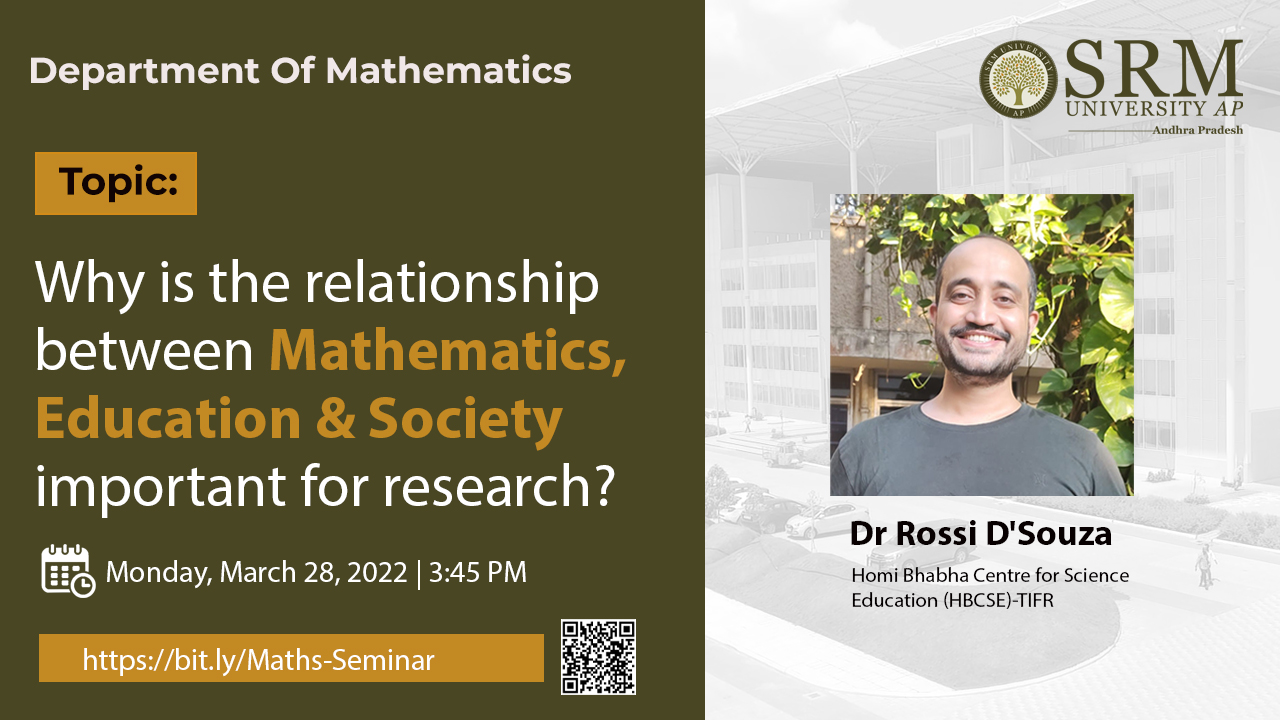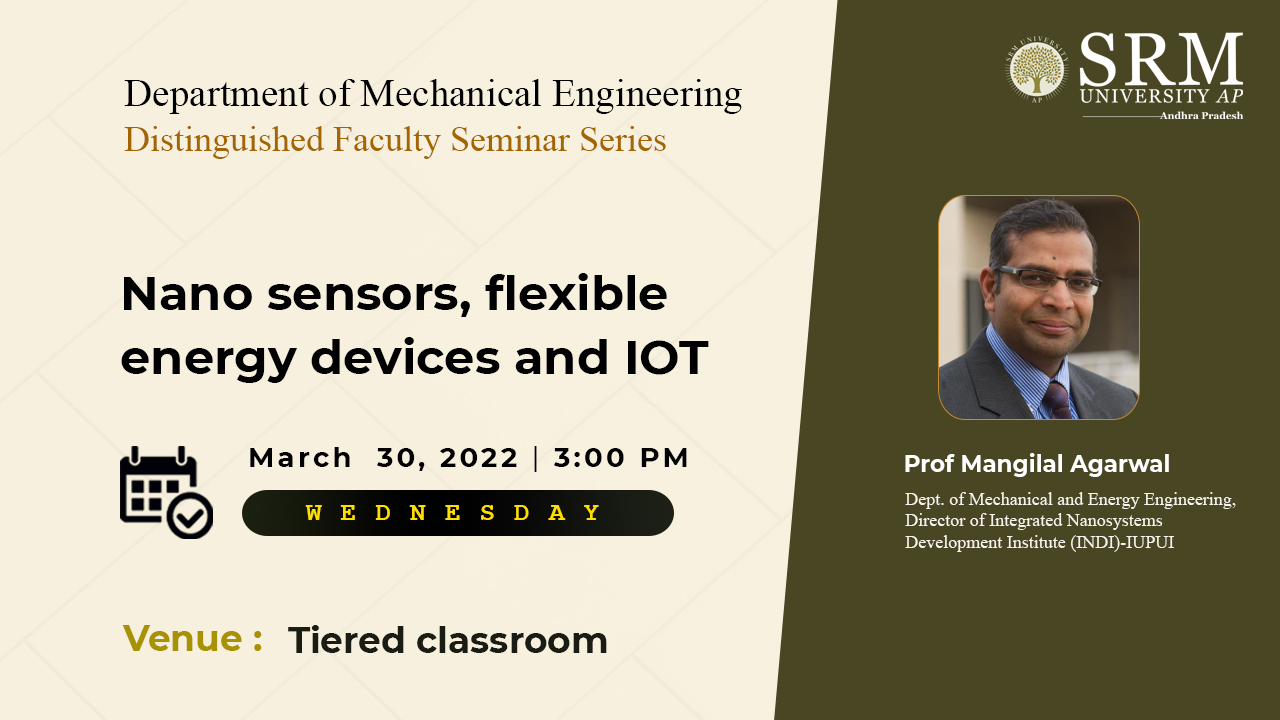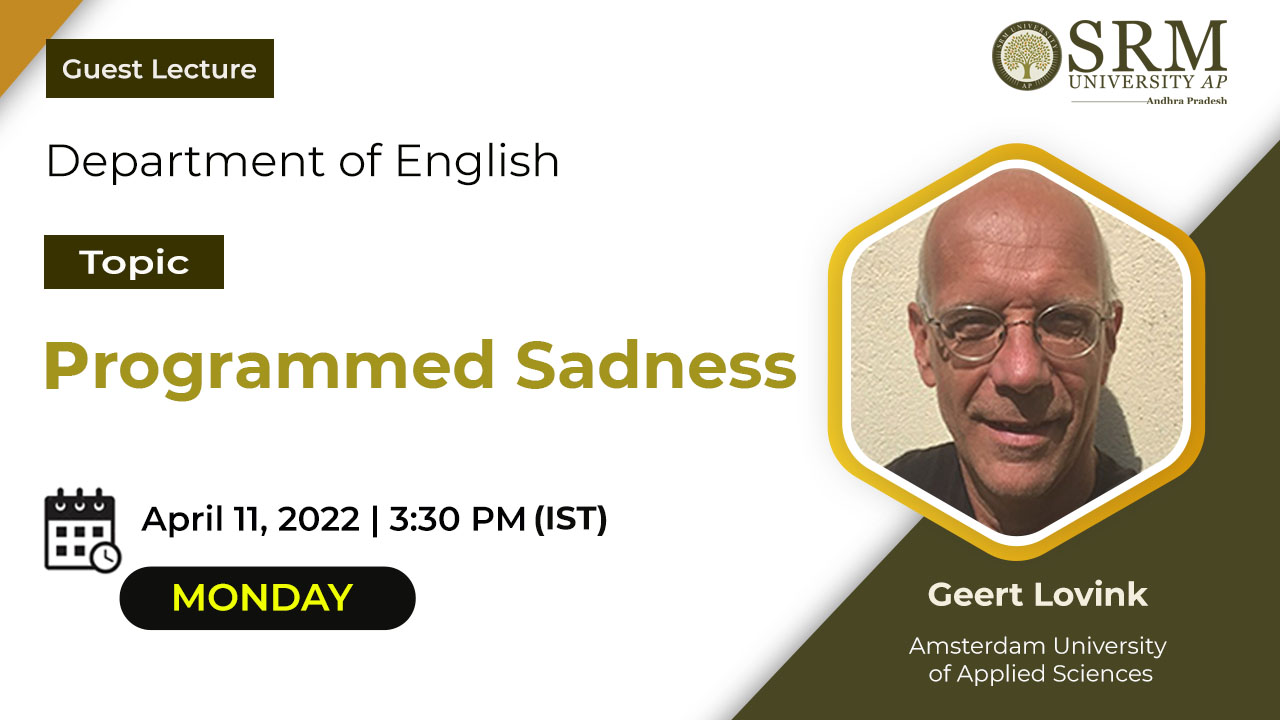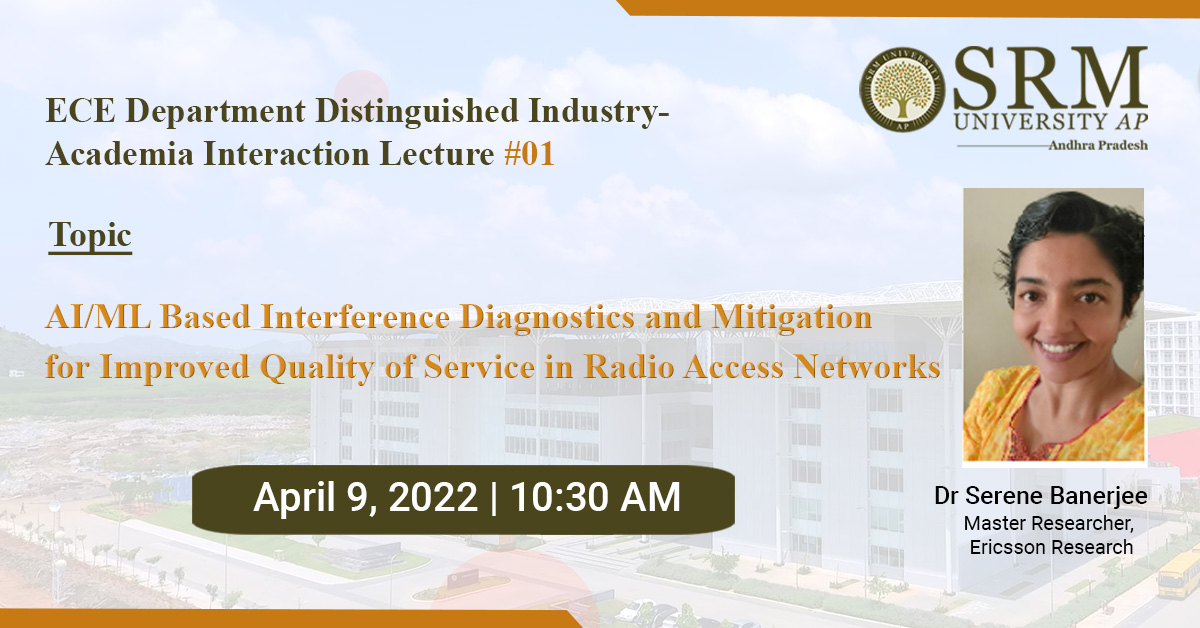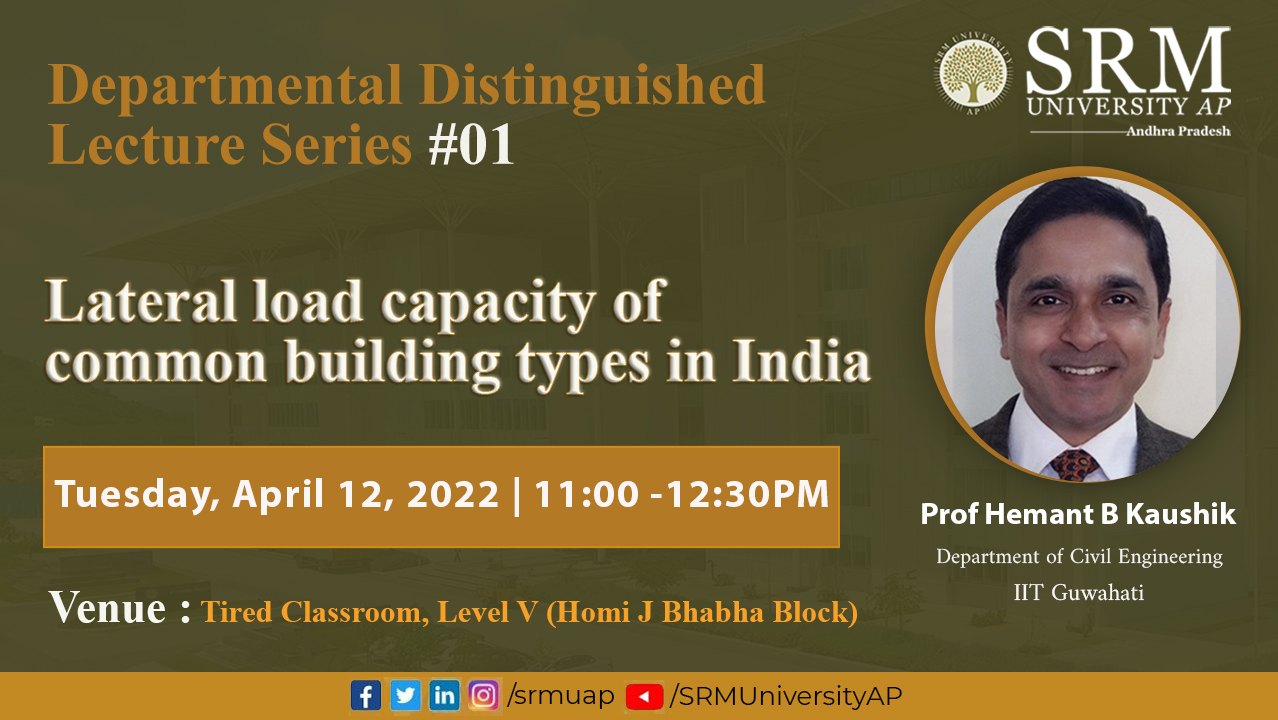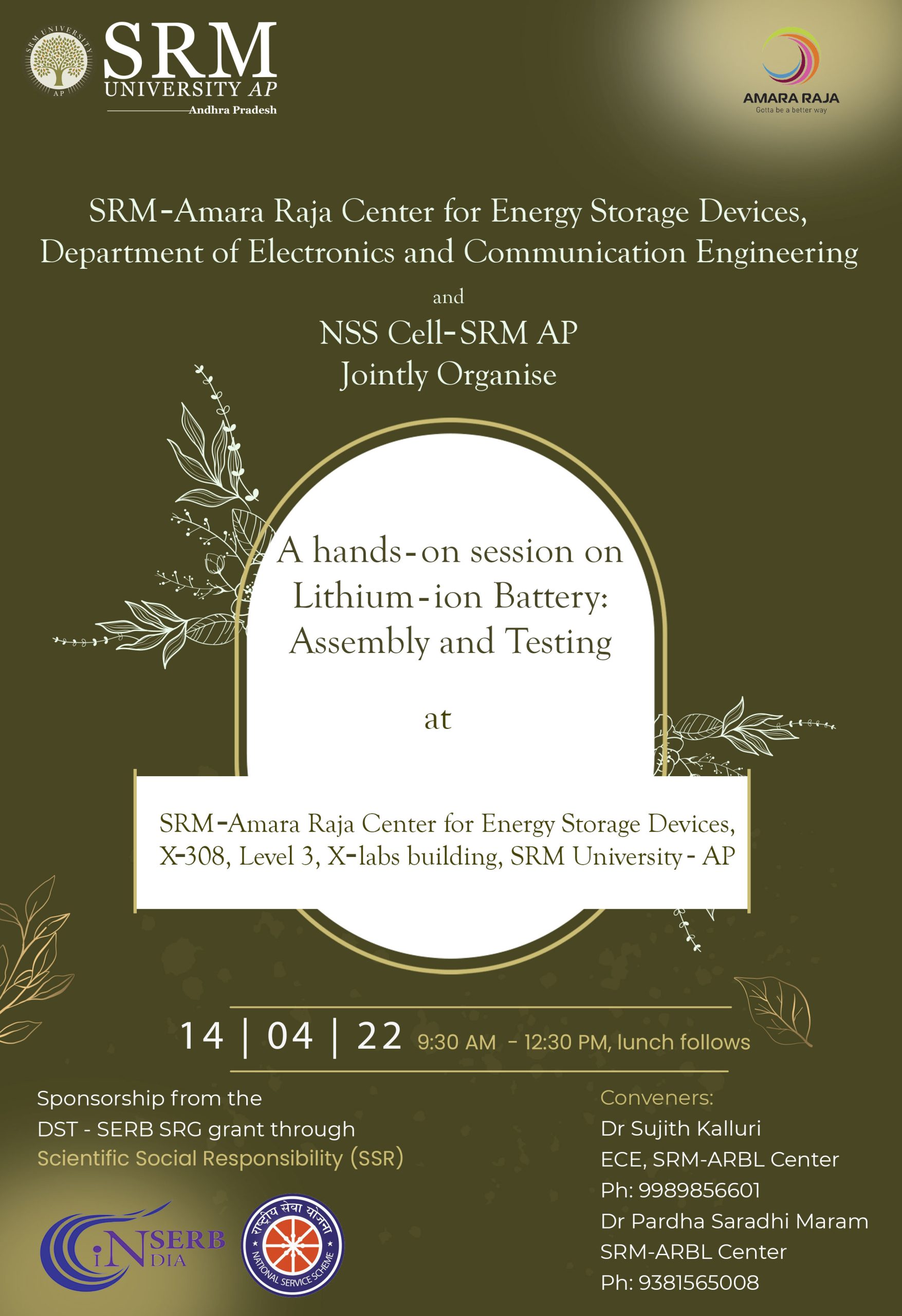Breaking the Mathematics myth
Have you ever thought Mathematics is a hard nut to crack? The Department of Mathematics brings to you Dr Rossi D’Souza to break the myth associated with Math. The seminar will be held on March 28, 2022 at 03.45 pm IST. Dr D’Souza, from Homi Bhabha Centre for Science will deliver a talk on ‘Why is the relationship between Mathematics, Education & Society important for research?’.
Abstract of the Talk
“Mathematics is hard!” has been a universal refrain among school children (and often their parents) for as long as we recall. But why do so many children dislike Mathematics? Is it the way Mathematics is taught – because Math teachers follow a “rote-learning” approach instead of making sure students understand the basic concepts? Why are students from marginalized backgrounds/identities disproportionately lagging behind in & excluded from Mathematics knowledge production? Or is Mathematics really not for everybody?
Drawing on experience from his PhD research with visually challenged students and industry experience the speaker will highlight the importance of taking into account the social factors in Mathematics Education Research to effectively address the challenges posed by STEM Education – and to work towards a world where Mathematics really is for everybody!
Speaker’s Profile
Dr Rossi D’Souza recently completed his PhD in Mathematics education from HBCSE-TIFR. His research interests include exploring how ableism operates in Mathematics education. Prior to working as a Research scholar, Rossi completed his M.Tech in Modeling and Simulation from Pune University, specializing in and then working in the field of Computational Genomics. He has also worked as a visiting lecturer at Govt. Polytechnic Mumbai, as a medical instrument repairman at Narayana Hrudayalaya Hospital, Bangalore and as a Science Communicator on the Science Express train.
Join the session with Dr D’Souza and make your Mathematics learning a delightful experience.
- Published in Departmental Events, Events, Math Events
Nano sensors and Flexible energy devices
The Department of Mechanical Engineering is hosting a Distinguished Departmental Faculty Seminar Series to encourage discussions on diverse aspects of the subject. Experts from various fields are invited to divulge their views and help students broaden their perspectives. The talk ‘Nano sensors, Flexible energy devices and IOT’ organised as part of the series will be held on March 30, 2022 at 3.00 pm IST. Prof Mangilal Agarwal, Director of Integrated Nanosystems Development Institute (INDI)-IUPUI is the distinguished speaker of the event. The talk will focus on Identification of volatile organic compound biomarkers in breath, development of integrated nanosensor systems and electrospinning epoxy/carbon nanotubes on carbon reinforced polymers for structural applications.
Speaker’s Profile
Prof Mangilal Agarwal is a full-time professor in the Department of Mechanical and Energy Engineering, Purdue University, Indiana, USA. He has an overarching vision to become an innovative leader in high-quality research and serve industry and government agencies in Indianapolis, the state of Indiana, and beyond.
Prof Agarwal has an array of interdisciplinary research projects at IUPUI involving big data, data analytics, machine learning, analytical chemistry, and mechanical engineering. Specifically, his research consists of canine-inspired chemometric analysis of volatile organic compound (VOC) biomarkers, developing integrated nanosensor arrays that detect VOC biomarkers sensitively or selectively, and enhancing carbon reinforced materials through electrospinning epoxy/carbon nanotube composite nanofibers.
Over the years Prof Agarwal’s research has been well received and funded through numerous grants from the National Science Foundation (NSF), National Institute of Health (NIH), Department of Defense (DoD) and the industry.
Prof Agarwal has previously served as the Associate Director for Research and Development for the IUPUI Office of the Vice Chancellors for research and is currently the Director of Integrated Nanosystems Development Institute (INDI) at IUPUI, which strives to advance nanotechnology research, education, and outreach.
- Published in Departmental Events, Events, Mechanical Engineering
Programmed sadness in the desire for connections and recognition
“Social media reality may be seen as a magical realm where we belong. That’s where the tribes gather, and that’s the place to be – on top of the world. Social relations in “real life” have lost their importance”– David Brooks
Technological sadness has become the default mental state of the online billions. The Department of English at SRM University-AP organises a guest lecture titled “Programmed Sadness” on April 11, 2022, to discuss the emotional analytics of network cultures. Prof Geert Lovink, Amsterdam University of Applied Sciences, will engage the participants at 3.30 pm on that day.
What happens when nothing can motivate you anymore, when all the self-optimisation techniques fail, and you begin to carefully avoid these forms of emotional analytics? Compared to others, your ranking is low – and this makes you sad. In this presentation, Dutch media theorist, internet critic and founder of the Institute of Network Cultures will discuss the dark side of the net. The mental state of internet users is tragic. Instead of empowerment and self-organisation, what we mostly see around is anger and despair. How did we end up like this? The lecture will zoom in on the widespread techno-sadness that is produced by dominant social media platforms through ‘behavioural modification’ (also known as ‘nudging’) with the aim to keep users coming back to the app, exposing them to even more personalised ads. Instead of empowerment and diversity, we witness a ‘chilling effect’ of hyper conformism, resulting in anger, sadness, depression and loneliness. This is the social reality today.
About the speaker
Geert Lovink is a Dutch media theorist, internet critic and author of Uncanny Networks (2002), Dark Fiber (2002), My First Recession (2003), Zero Comments (2007), Networks Without a Cause (2012), Social Media Abyss (2016), Organization after Social Media (with Ned Rossiter, 2018), Sad by Design (2019) and Stuck on the Platform (2022). He studied political science at the University of Amsterdam (UvA) and received his PhD from the University of Melbourne. In 2004, he founded the Institute of Network Cultures (www.networkcultures.org) at the Amsterdam University of Applied Sciences (HvA). His centre organises conferences, publications and research networks such as Video Vortex (online video), The Future of Art Criticism, and MoneyLab (internet-based revenue models in the arts). Recent projects deal with digital publishing experiments, critical meme research, participatory hybrid events and precarity in the arts. From 2007-to 2018, he was a Media Theory professor at the European Graduate School. In December 2021, he was appointed Professor of Art and Network Cultures at the UvA Art History Department.
All students and faculty members are invited to join this illuminating session on April 11, 2022, at 03.30 pm via the zoom platform.
- Published in Departmental Events, English, English Current Happenings, Events
AI/ML algorithms for radio access networks
The Department of Electronics and Communication Engineering is hosting the first instalment of the Distinguished Industry-Academia Interaction Lecture in the ECE DDIAL series. The event is scheduled on April 9, 2022, at 10.30 am. Dr. Serene Banerjee, Master Researcher, Ericsson Research, will be the keynote speaker. She will deliver a talk on the topic ‘AI/ML Based Interference Diagnostics and Mitigation for Improved Quality of Service in Radio Access Networks’.
Abstract of the Talk
For coverage and capacity optimization, Uplink Power Control is one of the key steps, in addition to antenna tilting and Downlink Power Control. For self-organizing networks, automated algorithms for Uplink Power Control are a necessity. However, Uplink Power Control affects the noise in the neighbouring cells. It is important to detect this interference to monitor uplink noise. Uplink noise due to power control manifests as static interference in the channel. The current state-of-the-art baseline model is based on regression models. We have proposed automated detection of static interference in the uplink channel of cells based on machine learning models. We have evaluated the same on customer data on LTE networks with high accuracy. The detected cells are subsequently used to correct the nominal power parameter through a proposed teacher-student model based on the primary cell and its neighbours. This approach shows better performance than the state-of-the-art baseline methods. The dual of static is dynamic interferences and can be attributed to traffic load, Passive Intermodulation (PIM) and thermal noise, etc. PIM identification is a major component in troubleshooting modern wireless communication systems. The introduction of carrier aggregation has increased PIM occurrences. Current state-of-the-art approaches include manual rule-based and hardware-based debugging. These approaches can detect the occurrence of PIM, long after the event occurrence and result in incurring incidental costs. We propose an ensemble of time series-based machine learning and signal processing approaches that can automatically identify PIM in real-time by analyzing Key Performance Indicators (KPI) of the primary cell and its nearest neighbours. We validate our results for various environmental conditions in data available from LTE and 5G consumer networks. We have further extended the work to multi-frequency time series to handle finer time granularities and detect PIM anomalies in an online learning setting. We further propose a self-supervised reinforcement learning approach to predict PIM related anomalies before it happens. We forecast environmental conditions that give rise to PIM based on offline historical data and model to predict future occurrences. Experimental results are on real-world datasets comprising 50,000+ cells which have shown to accurately predict PIM 60% of the time. To the best of our knowledge, this is the first work, where we are able to predict PIM anomalies before they happen. Post PIM-identification, we propose a binary search-based solution that is amenable to real-time implementation. We show through simulations that this search in tandem with a reinforcement learning-based solution can dynamically mitigate and cancel PIM. Results show that the number of steps to converge, to identify and mitigate the PIM in uplink frequency is reduced by a large factor. To summarize, our contributions include using machine learning algorithms for: (1) robust interference classification, (2) demonstrating p0-nominal recommender as teacher-student model, (3) a times-series analysis-based PIM identification, (4) extending the approach to multi-frequency time series, and for online learning, (5) demonstrating a self-supervised reinforcement learning approach to predict PIM anomalies before they happen, and (6) mitigating PIM, in spite of environmental unknowns, by employing binary search in conjunction with ML/RL-based approaches.
About the Speaker
Serene Banerjee, Master Researcher, Ericsson Research, has 17+ years of industrial experience after completing her PhD from the University of Texas at Austin, under Prof Brian L Evans in 2004. She has completed BTech(H) in Electronics and Electrical Communications Engineering from IIT Kharagpur in 1999. At Ericsson, she is focusing on developing AI/ML algorithms for Radio Access Networks. Prior to Ericsson, she has worked with Texas Instruments, HP, and Johnson Controls. She has 23 peer-reviewed publications, 9 granted patents, and several pending.
Join the webinar for an informative interaction with Dr Serene Banerjee.
- Published in Departmental Events, ECE Events, Events
Lateral load capacity of common building types in India
The Department of Civil Engineering is organising the first physical lecture as part of the Departmental Distinguished Lecture Series on April 12, 2022 from 11.00 pm to 12.30 pm. Prof Hemant B Kaushik from the Department of Civil Engineering, IIT Guwahati is the distinguished speaker of the event. He will deliver a talk on the topic “Lateral load capacity of common building types in India”. This talk will provide detailed insights into the seismic behaviour of different building types in India. Various experimental results of full-scale model tests on shake tables and actuators will also be presented.
Speaker’s Profile
Prof Hemant B Kaushik is currently working at IIT Guwahati in the Department of Civil Engineering and Centre for Disaster Management and Research. He is also the Associate Dean of Academic Affairs and the Head of the Centre for Educational Technology. His research areas broadly include: earthquake resistant design of structures, nonlinear behavior of structures, retrofitting of structures, seismic vulnerability assessment of structures, earthquake damage surveys etc. He was the recipient of the INAE Young Scientist Award in 2010 and 2013. He also received the David Fischetti Award in 2019, presented by the Preservation Engineering Technical Committee (PETC) of the Association for Preservation Technology International (APT), USA. The award recognises an outstanding article in a peer-reviewed publication that advances the field of conservation engineering. Prof Kaushik is also a member of the Earthquake Engineering Sectional Committee, CED 39, Bureau of Indian Standards. He also holds membership in several professional bodies like Earthquake Engineering Research Institute (EERI), USA, American Society of Civil Engineers (ASCE), USA, The Masonry Society (TMS), USA, Indian Society of Earthquake Technology (ISET), India and Institution of Engineers, India. He has contributed several post-earthquake reconnaissance study reports and papers in reputed journals and conferences.
All are invited to join this informative lecture on Tuesday, April 12, 2022, from 11.00 pm to 12:30 pm.
- Published in Civil Engg events, Departmental Events, Events
A hands-on session on lithium-ion battery: assembly and testing
Allowing students to explore more into their learning domain will invariably enhance their quest for knowledge. The more students are encouraged to experiment with problems, tools, and substances they will work with, the better prepared they are to face any challenge head-on. It is also a better rewarding alternative as against the conventional book learning method.
Taking the current scenario into account,imparting hands-on training on cutting-edge developments is an excellent exercise to inculcate scientific spirit in young minds. Such initiatives should be actively promoted to equip students on par with the fast-evolving technological realm. We are delighted to announce that the SRM-Amara Raja Center for Energy Storage Devices, Department of Electronics and Communication Engineering, collaborates with NSS Cell-SRM AP to organise a “Hands-on Session on Lithium-ion Battery: Assembly and Testing” with the sponsorship from the DST-SERB Start-up Research Grant (SRG).
Date: April 14, 2022
Time: 9.30 am to 12.30 pm IST
We invite all the interested students to become part of this invigorating initiative and make the best use of this opportunity to receive an enriching training session. The event is also followed by lunch for all the participants.
- Published in Departmental Events, ECE Events, Events
Scalar conservation laws in one space dimension with strict convex flux
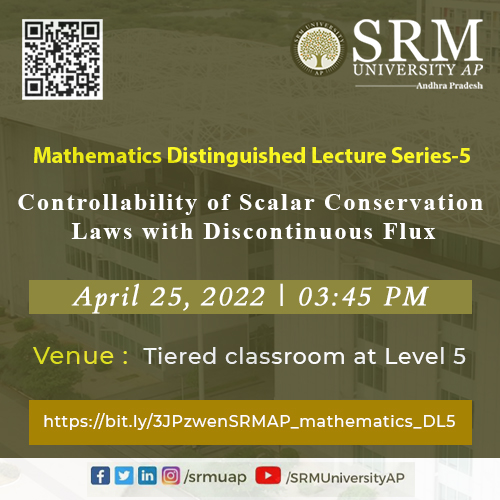
The Department of Mathematics is arranging the fifth instalment of the Departmental Distinguished Lecture Series on April 25, 2022, at 3.45 pm IST. Reputed Mathematician, Prof A Adimurthi will deliver an informative lecture on the topic ‘Controllability of Scalar Conservation Laws with Discontinuous Flux’.
About the Talk
Navier-Stokes and Euler equations play an important role in studying the flow of incompressible fluids. Weak solutions to these equations can be obtained by Galerkin method but the uniqueness is a big open problem. It is a big challenge to obtain an extra condition for the class of functions, so that in this class obtain the existence and uniqueness. To understand this phenomenon, it is better to look at a one-dimensional case where the equation turns out to be viscous Burger’s equation or Burger’s equation with non-linearity is of quadratic order. In this talk, we will restrict to Burger’s type equations called the Scalar Conservation Laws in one space dimension with strict convex flux. Way back in the 50’s, this equation was studied by Lax and Oleinik and obtained an explicit formula for a solution. Oleinik showed that this satisfies an extraction called the Entropy Condition and then showed that in this class, the solution is unique. Later Kruzkov, in an ingenious way, generalized this to obtain a unique solution for Scalar Conservation Law in higher dimensions and Lipschitz fluxes. This result was taken up by Zuazua and his collaborators and studied the Optimal Controllability for Burgers equation. They showed the existence of optimal control and to capture this, they derived a numerical algorithm whose convergence is still open. In a different direction, this was attacked, and the problem was completely solved. Getting the optimal solution is via projection method in a Hilbert space. Recently, this was extended in a non-trivial way to conservation laws with convex discontinuous flux. The talk will explain the main ideas of this work.
About the Speaker
A mathematician of repute, Prof A Adimurthi has been associated with the Tata Institute of Fundamental Research, Centre for Applicable Mathematics Bangalore. At present, he is working as a visiting professor at the Department of Mathematics and Statistics, IIT Kanpur. He has authored more than a hundred research articles on a wide range of topics including Partial differential equations, Functional analysis, Numerical analysis, Calculus of variations, Optimal control, and many others. Prof Adi Adimurthi has been elected as a fellow of; The Indian Academy of Sciences (F.A.Sc) Bengaluru (1996), The National Academy of Sciences (F.N.A.Sc), India in 1997, The Indian National Science Academy (F.N.A) in 1998, The World Academy of Sciences(TWAS) in 2018, Raja Ramanna and DST J.C. Bose National. Along with these fellowships, Professor Adimurthi has also been honoured with the prestigious Dr Zakir Hussain Award in 2013.
Join this informative talk with Prof A Adimurthi on April 25, 2022 at 3.45 pm IST.
- Published in Departmental Events, Events, Math Events
The art of airport engineering
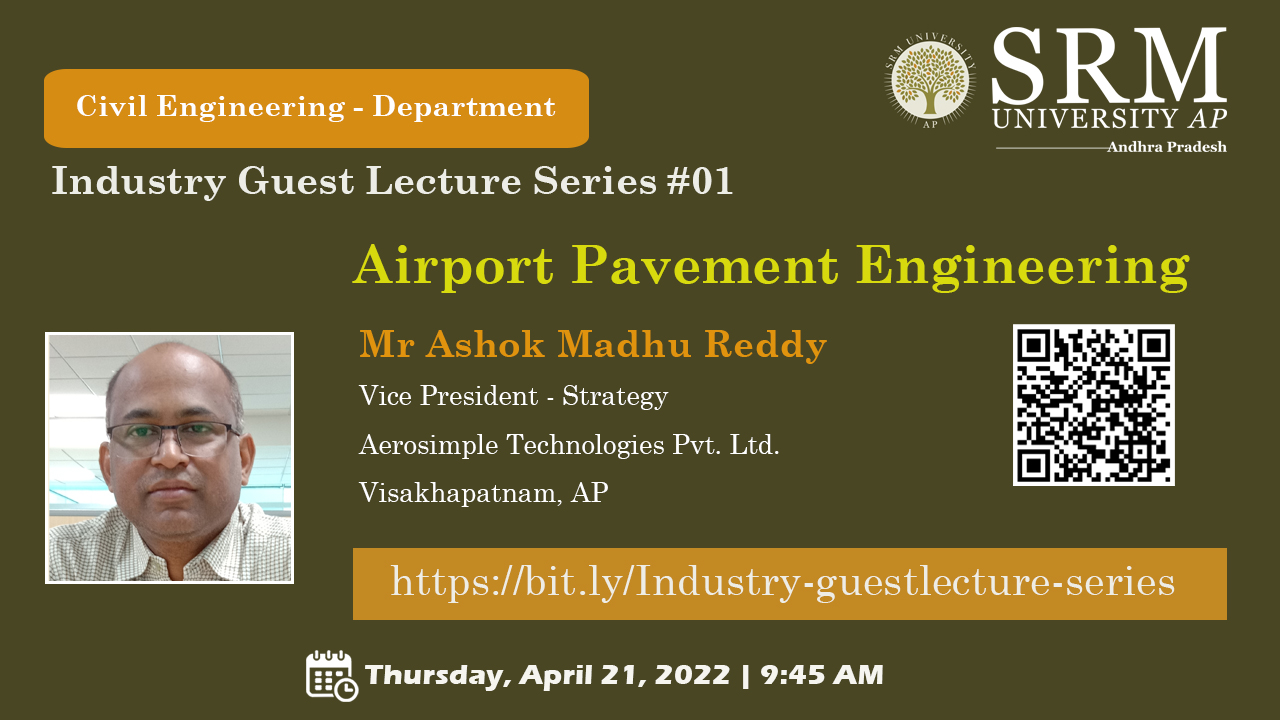 The Department of Civil Engineering is all set to kick start their first Industry Guest Lecture Series on April 21, 2022. The lecture is scheduled from 9.45 am to 10.45 am followed by a Q&A session. Renowned aviation professional Mr Ashok Madhu Reddy, who has an experience of 25 years in airplane or airport operation, will deliver the talk on Airport Pavement Engineering.
The Department of Civil Engineering is all set to kick start their first Industry Guest Lecture Series on April 21, 2022. The lecture is scheduled from 9.45 am to 10.45 am followed by a Q&A session. Renowned aviation professional Mr Ashok Madhu Reddy, who has an experience of 25 years in airplane or airport operation, will deliver the talk on Airport Pavement Engineering.
The viability of the airport infrastructure is indeed a challenge in airport engineering. Airport pavement plays an important role in this scenario. The lecture intends to discuss the History of ICAO, airport planning, design, and maintenance in detail.
About the Speaker
Mr Ashok Madhu Reddy is an aviation professional with 25 years of experience in Airline/Airport Operations and Management. He is presently working as the Vice President of Aerosimple Technologies Pvt. Ltd., Visakhapatnam, AP which is an IT software company that specialises in SAAS for Airport operations and Management, serving 35 airports across the globe.
He was India’s first personnel who attained the “International Airport Professional” certification jointly issued by International Civil Aviation Organization (ICAO) and Airports Council International (ACI) Montreal, Canada. This was the only program in the world recognized by the United Nations (UN) to bring global standards worldwide. He is also a Board Director of the American/International Association of Airport Executives (AAAE/IAAAE).
Mr Ashok has two post-graduation degrees in management from India and UK. Previously, he worked with Air India, Srilankan Airlines, GMR Hyderabad and Delhi Airports, and AP Airport Development Corporation in various management capacities. He is also having multiple aviation certification courses to his credit.
Register for the webinar and get to know about Airport Pavement Engineering from the professional himself.
- Published in Civil Engg events, Departmental Events, Events
Ultra-low power and agile IC design for novel sensor nodes for the Internet of Things
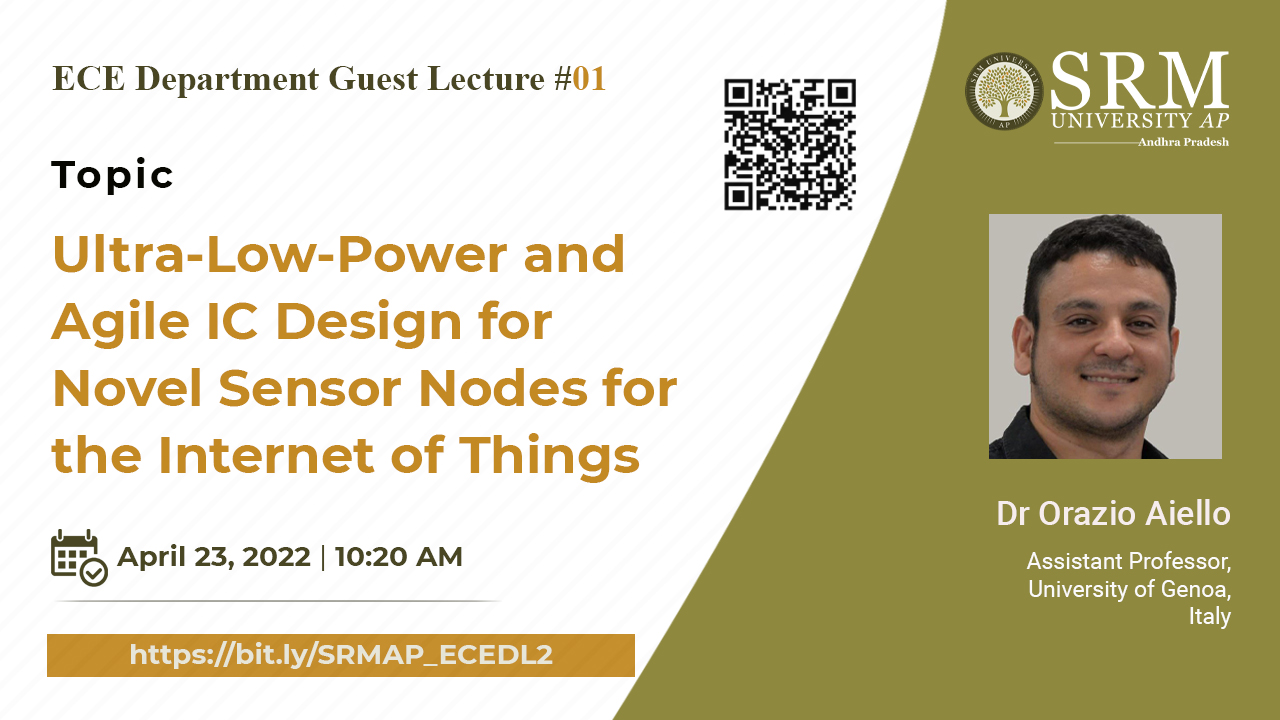
The Internet of Things (IoT) has greatly increased our awareness of the world and broadened the scope of our engagement with it. In the first episode of the ECE Department Guest Lecture Series, the Department of Electronics and Communication Engineering at SRM University-AP is organising a lecture on April 23, 2022, from 10.20 am to 12.00 noon. Dr Orazio Aiello, Assistant Professor at the University of Genoa, Italy, will engage the audience on the topic Ultra-Low-Power and Agile IC Design for novel Sensor Nodes for the Internet of Things on that day.
The vision of a world where pervasive integrated electronic systems embedded in everyday life objects (e.g. household appliances, surveillance cameras, healthcare systems) are fully interconnected to collect, process, and exchange useful information requires energy-autonomous systems for distributed sensing and data acquisition. The low-cost requirement demands a small area, low design effort, digital-like shrinkage across CMOS generations, and design/technology portability. The possibility to exploit the digital (automated) design flow even for analog building blocks can dramatically reduce the design effort of any system-on-chip that faces the analog signal. Since data processing is digital, but most signals from the real world are analog, almost any electronic device that interfaces with the surrounding environment will benefit from the outcomes of this investigation. In this framework, the talk illustrates the concepts and the design flows which enable the implementation of analog functions by true digital circuits.
Biography of the speaker:
Orazio Aiello (Senior Member, IEEE) received the BSc and MSc degrees (cum laude) from the University of Catania, Italy, in 2005 and 2008, respectively, the M.Sc. degree (cum laude) from the Scuola Superiore di Catania, Italy, in 2009, and the PhD degree from the Politecnico di Torino, Italy, in 2013.,From 2008 to 2009, he was an Analog IC Designer and an EMC Consultant for STMicroelectronics, Castelletto, Italy. In 2012, he was a Visiting PhD. A student with Monash University, Melbourne, Australia. In 2013, he was a Research Fellow in a joint project with FIAT-Chrysler Automobiles, Turin. In 2014, he joined NXP-Semiconductors, Nijmegen, The Netherlands, as a Mixed Signal IC Designer and an EMC Expert. In 2015 and 2016, he was a Visiting Fellow with the University of Sydney and the University of New South Wales, Sydney, Australia. Since 2015, he has been working with the Green IC Group, Department of Electronics and Communication Engineering (ECE), National University of Singapore, where he has also been a Marie Skłodowska-Curie Individual and a Global Fellow leading the ULPIoT project. He is now an Assistant Professor at the University of Genova, Italy. His main research interests include energy-efficient analogue-mixed signal circuits and sensor interfaces. Dr Aiello is a member of the IEEE CASS Microlearning AdHoc Committee and is/was a Technical Program Committee Member of a number of conferences, such as NORCAS and APCCAS.
Join this informative lecture with Dr Orazio Aiello on April 23, 2022 at 10.20 am IST.
- Published in Departmental Events, ECE Events, Events, Webinars
Stay Curious! Join the Research Clan
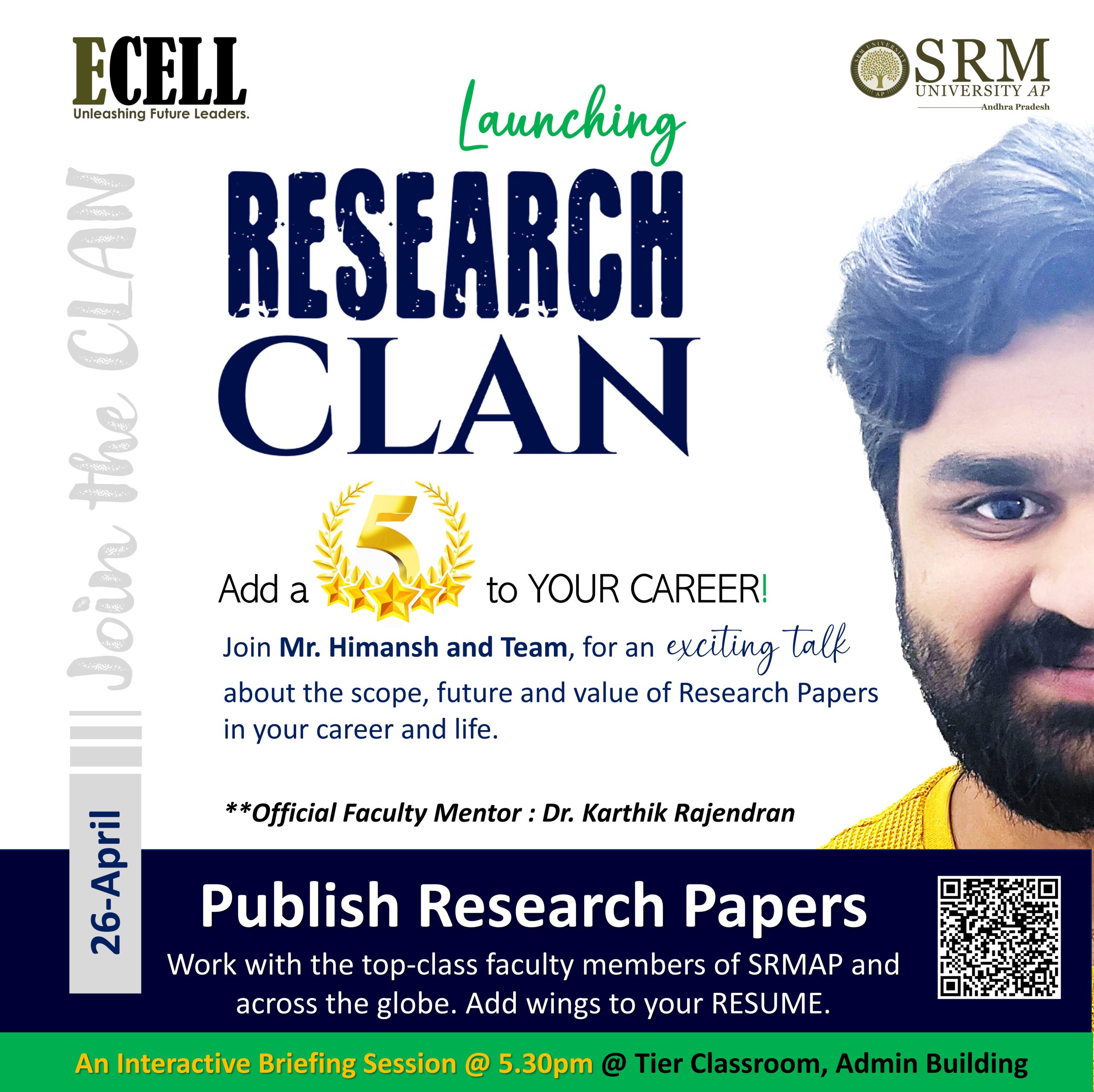 The whole purpose of education is to turn mirrors into windows – Sydney J Harris
The whole purpose of education is to turn mirrors into windows – Sydney J Harris
Every day is a chance to learn and unlearn things. The higher the curiosity to know more, the deeper your roots in a hopeful life. Productive utilization of knowledge has always been the key to success. Finding the application levels of the knowledge you gained and reflecting on yourself makes a huge difference from passive learning.
The Department of Entrepreneurship and Innovation is proud to announce the launch of Research Clan. This community holds the insights of research works and converts the concepts into something useful for the world. Mr. Himanshu and the team will be presenting an exciting talk about the scope, future, and value of Research papers in your career and life.
Join the clan on April 27, 2022, at 5.30 pm
Venue: Tier Classroom, Admin Building
- Published in Departmental Events, Events, IDEA Events


